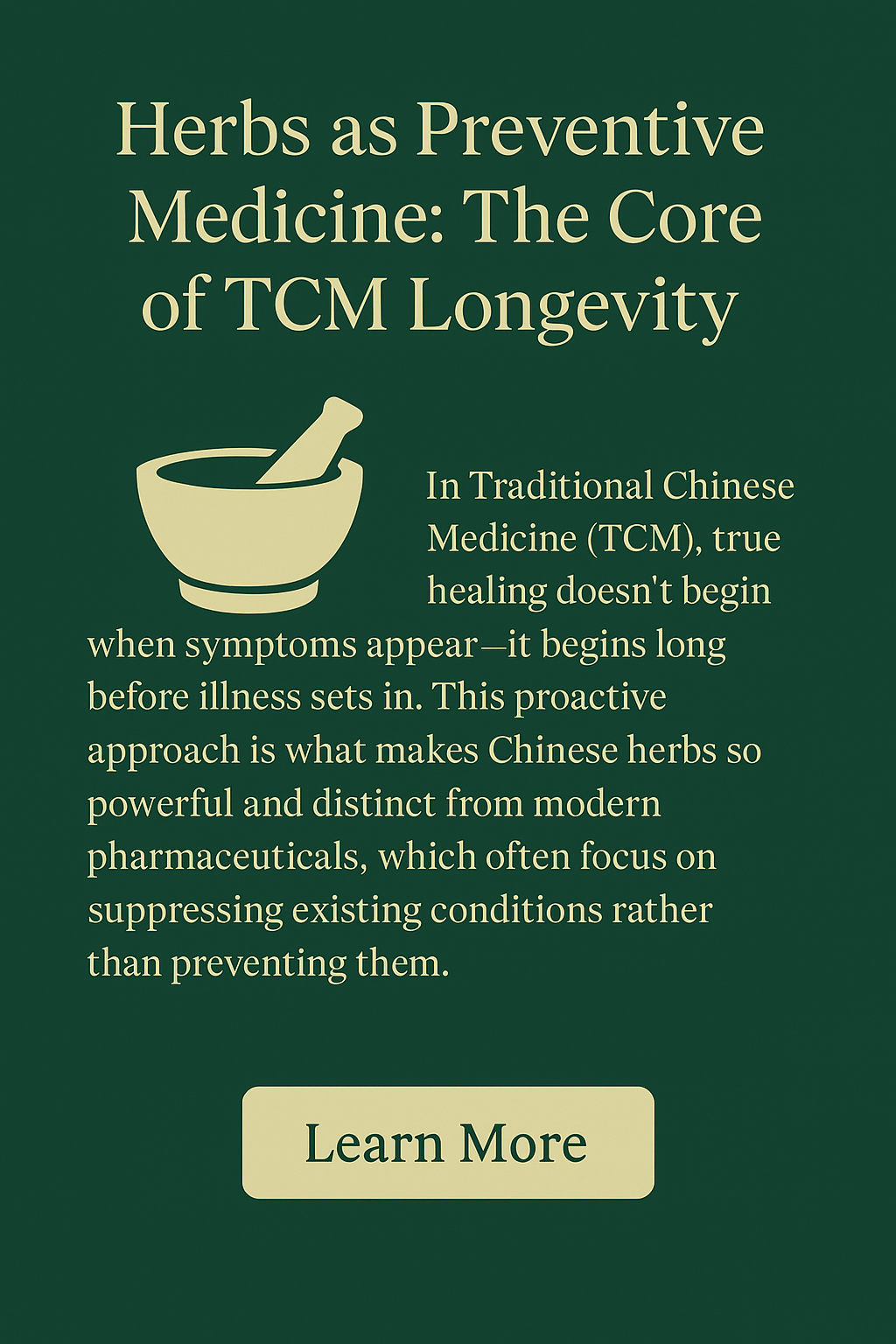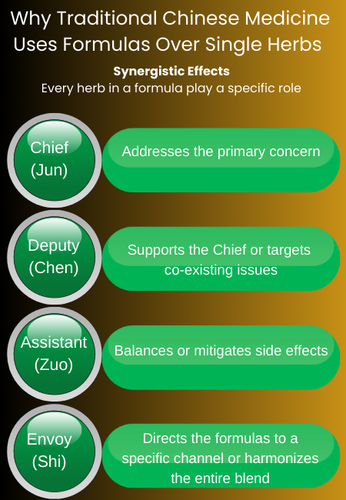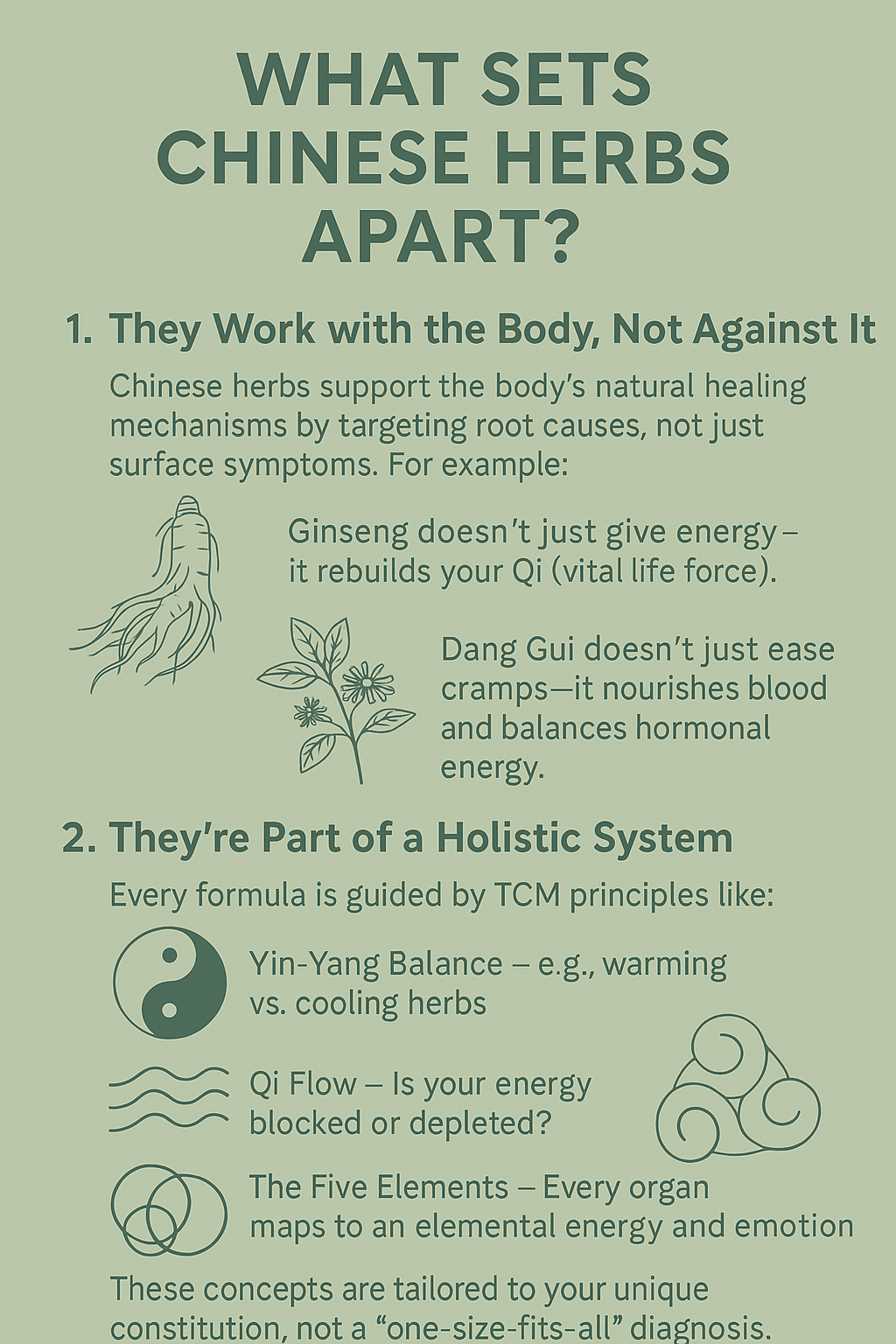What Makes Chinese Herbs Unique? A Deep Dive into the Healing Wisdom of TCM
Posted by Sarah Aries on Apr 24th 2025
What Makes Chinese Herbs Unique? A Deep Dive into the Healing Wisdom of TCM
Chinese herbs are not just remedies—they’re deeply rooted in an ancient system that views health as harmony. Unlike Western approaches that focus on suppressing symptoms, Traditional Chinese Medicine (TCM) uses herbs to nourish, rebalance, and support the entire body.
In this guide, we’ll explain why Chinese herbs are so unique, how they work based on TCM theory, and how you can use them to support long-term wellness. Whether you're curious, cautious, or a seasoned herbal enthusiast—this article will demystify the philosophy, science, and power behind Chinese herbal medicine.
What Sets Chinese Herbs Apart?
1. They Work with the Body, Not Against It
Chinese herbs support the body's natural healing mechanisms by targeting root causes, not just surface symptoms. For example:
-
Ginseng doesn’t just give energy—it rebuilds your Qi (vital life force).
-
Dang Gui doesn't just ease cramps—it nourishes blood and balances hormonal energy.
2. They're Part of a Holistic System
Every formula is guided by TCM principles like:
-
Yin-Yang Balance – e.g., warming vs. cooling herbs
-
Qi Flow – Is your energy blocked or depleted?
-
The Five Elements – Every organ maps to an elemental energy and emotion
These concepts are tailored to your unique constitution, not a “one-size-fits-all” diagnosis.
Chinese Herb Properties at a Glance
| Herb Name | Nature | Flavor | TCM Function |
|---|---|---|---|
| Bai Tou Weng | Cold | Bitter | Clears heat, resolves dysentery |
| Dang Gui | Warm | Sweet, Pungent | Nourishes blood, regulates menses |
| Huang Qi (Astragalus) | Warm | Sweet | Boosts Qi, strengthens immunity |
| Chen Pi | Warm | Pungent, Bitter | Regulates Qi, harmonizes digestion |
| Wu Wei Zi (Schisandra) | Warm | Sour | Astringes leakage, calms Shen |
How Chinese Herbs Are Classified
Unlike Western herbs, Chinese herbs are categorized by:
-
Temperature: hot, warm, neutral, cool, cold
-
Flavor: sweet (tonify), bitter (drain heat), sour (astringe), pungent (disperse), salty (soften)
-
Meridian Entry: which organ(s) the herb targets
This system helps practitioners create precise combinations that match the body’s pattern of imbalance.
Chinese Herbal Formulas vs. Single Herbs: The Power of Synergy in TCM
In Traditional Chinese Medicine (TCM), healing doesn’t rely on just one herb—it relies on strategically crafted formulas. These formulas are carefully composed combinations of herbs, designed to work together in harmony to amplify benefits, minimize side effects, and address multiple body systems at once.
Unlike the Western model of isolated herbal use or synthetic drugs targeting one symptom, TCM understands the body as an interconnected network. That’s why a single-herb approach is rarely used in clinical Chinese medicine.
Why TCM Uses Formulas Over Single Herbs
1. Synergistic Effects
Every herb in a formula plays a specific role:
-
The Chief (Jun) herb addresses the primary concern.
-
The Deputy (Chen) supports the Chief or targets co-existing issues.
-
The Assistant (Zuo) balances or mitigates side effects.
-
The Envoy (Shi) directs the formula to a specific channel or harmonizes the entire blend.
This structure ensures that the herbs complement and enhance each other, leading to greater therapeutic results than any one herb could provide alone.
Example: In the classic formula Xiao Yao San (Free & Easy Wanderer), multiple herbs work together to regulate liver Qi, nourish the blood, and calm the mind—making it effective for stress, PMS, and digestion, all in one blend.
2. Balancing Temperature and Energetics
In TCM, herbs are classified by their temperature (hot, warm, neutral, cool, cold). Formulas are designed to balance these temperatures so that the overall effect is neither too warming nor too cooling for the patient.
Example: If a cold herb is used to clear heat or reduce inflammation, a small amount of warming herb like Sheng Jiang (Fresh Ginger) may be added to protect the digestive fire and ensure smoother assimilation.
This balancing act makes formulas gentler on the body, especially for those with sensitive digestion or chronic conditions.
3. Targeting Multiple Systems Simultaneously
The body doesn’t operate in isolation, and neither should its treatment. Most herbal formulas are designed to address multiple organ systems, emotional states, and symptom patterns at once.
Example: A stress formula may not only calm the Shen (spirit) but also support liver Qi flow, ease digestive stagnation, and nourish heart blood.
This multi-targeted approach is particularly helpful for:
-
Complex or chronic conditions
-
Mind-body issues (e.g., anxiety + IBS)
-
Hormonal imbalances tied to emotional stress
4. Minimizing Side Effects
By combining herbs, TCM practitioners can counterbalance the harsh effects of certain ingredients:
-
A strong purgative may be softened by a moistening herb.
-
A bitter, draining herb can be tempered by a sweet, harmonizing one.
-
Toxic herbs (used sparingly) are often buffered by herbs that protect the stomach or liver.
This wisdom of pairing is why TCM formulas are often better tolerated than single, concentrated herbal extracts or isolated compounds.

Herbs as Preventive Medicine: The Core of TCM Longevity
In Traditional Chinese Medicine (TCM), true healing doesn't begin when symptoms appear—it begins long before illness sets in. This proactive approach is what makes Chinese herbs so powerful and distinct from modern pharmaceuticals, which often focus on suppressing existing conditions rather than preventing them.
Strengthening Immunity Before Illness Strikes
Rather than waiting for cold or flu season to hit, TCM practitioners often recommend tonifying herbs to build up Wei Qi (defensive energy), the body’s first line of protection.
-
Huang Qi (Astragalus) is widely used to strengthen the lungs and immune system, helping the body resist external pathogens.
-
Fang Feng and Jin Yin Hua are also commonly prescribed to expel wind and early-stage colds before they develop into more serious conditions.
Supporting Sleep and Mood in Times of Stress
Emotional and mental wellness is deeply connected to physical health in TCM. Instead of reaching for sedatives or stimulants, Chinese herbs gently support the Shen (spirit) and restore balance to the heart, liver, and kidney systems—the organs most impacted by chronic stress.
-
Suan Zao Ren (Sour Jujube Seed) calms the mind and aids in falling asleep naturally.
-
He Huan Pi is known as the “bark of happiness,” used to ease irritability, mood swings, and emotional tension.
Regulating Cycles and Transitional Phases
Whether it’s the change of seasons, menopause, or postpartum recovery, TCM uses herbs to harmonize the internal rhythms of the body during times of transition.
-
Dang Gui nourishes blood and supports hormonal regulation during menstrual or menopausal shifts.
-
Sheng Jiang (Fresh Ginger) and Chen Pi are often used to harmonize digestion and Qi movement during seasonal transitions or after illness.
Building Long-Term Resilience
What truly sets Chinese herbs apart is their ability to build adaptive resilience over time. Many tonic herbs are categorized as superior herbs (Shang Pin) in the classical texts, meaning they can be used safely over long periods to enhance longevity and vitality.
-
Reishi (Ling Zhi) is a prime example: a revered mushroom used for decades to support immunity, mood, liver function, and overall well-being.
-
Goji Berries (Gou Qi Zi) are another staple, boosting energy, vision, and reproductive health when consumed regularly.
Why It Matters To You!
In today’s fast-paced, symptom-driven health culture, Chinese herbs offer a refreshing alternative:
They work slowly, steadily building up the body’s ability to adapt, resist, and restore. Preventive herbalism isn’t just about avoiding sickness—it’s about creating a life of vibrancy, resilience, and inner harmony.
At 1st Chinese Herbs, we specialize in preventive formulas trusted by both practitioners and wellness enthusiasts. From single herbs to time-tested blends, we offer tools to help you stay balanced before imbalances begin.
Science Meets Tradition: Validating Chinese Herbs with Modern Research
For centuries, Traditional Chinese Medicine (TCM) has relied on herbs to restore balance and promote long-term wellness. What was once viewed purely as “folk medicine” is now gaining increasing validation from the scientific community. Today, we see a remarkable convergence: ancient wisdom backed by modern evidence.
Below are a few key herbs traditionally used in TCM that now enjoy strong support from peer-reviewed clinical and pharmacological studies, many published on PubMed (the U.S. National Library of Medicine's biomedical database).
Astragalus (Huang Qi) – Immunity and Anti-Aging
Long revered in TCM for its ability to tonify Qi and protect against illness, Astragalus membranaceus is now scientifically recognized for its immune-modulating and anti-aging effects.
-
✅ Immune Support: Astragalus enhances macrophage function, promotes antibody production, and boosts overall immune response.
Read the study on Astragalus and immune modulation (PubMed) -
✅ Telomerase Activation & Anti-aging: Certain extracts may activate telomerase, potentially slowing cellular aging.
Study: Astragalus root extract and telomerase (PubMed)
Rhodiola (Hong Jing Tian) – Stress Resilience and Fatigue
Though used in Siberian and Tibetan medicine as well, Rhodiola has strong TCM roots and is considered a powerful adaptogen—an herb that helps the body resist stress without overstimulating.
-
✅ Cortisol Regulation & Mental Fatigue: Rhodiola supports adrenal health, stabilizes cortisol levels, and improves cognitive function under stress.
Rhodiola’s effect on stress and fatigue (PubMed) -
✅ Athletic and Cognitive Endurance: Several clinical trials show improved stamina, reduced fatigue, and enhanced learning.
Study on Rhodiola and physical performance (PubMed)
Ginseng (Ren Shen) – Adaptogen, Immune Tonic, Cognitive Enhancer
A pillar of TCM, Panax ginseng has been studied extensively for its neuroprotective, endocrine-modulating, and immune-enhancing properties.
-
✅ Cortisol Reduction & Adaptogenic Effect: Helps regulate the HPA axis and improve resilience to stress.
Review on ginseng’s adaptogenic properties (PubMed) -
✅ Immunity & Anti-fatigue: Ginseng has been shown to enhance natural killer cell activity and support recovery from chronic fatigue.
Ginseng and immune function (PubMed)
Schisandra (Wu Wei Zi) – Liver Protection, Stress, and Detox
Used for over 2,000 years to calm the Shen, improve stamina, and tonify the kidneys and liver, Schisandra chinensis is now known to support liver detoxification pathways and adaptogenic function.
-
✅ Liver Detoxification & Antioxidant Effect: Schisandra enhances phase I and phase II liver detox processes and protects hepatocytes from damage.
Study on Schisandra and liver protection (PubMed) -
✅ Neuroprotection and Stress Relief: Improves learning, memory, and reduces cortisol response in stressful environments.
Schisandra’s adaptogenic potential (PubMed)
✅ Why This Matters: The Best of Both Worlds
What makes Chinese herbs so compelling today is this unique synergy: a 2,000+ year tradition of clinical observation, now supported by rigorous laboratory and clinical research.
-
TCM provides the framework to understand how herbs interact with our energetic systems, while science confirms their measurable impact on immunity, brain chemistry, hormonal balance, and cellular function.
-
As a result, more practitioners, researchers, and consumers are embracing Chinese herbal medicine for both preventive care and therapeutic support.
At 1st Chinese Herbs, we proudly source herbs that are:
-
Lab-tested for purity and potency
-
Geo-authenticated to ensure species accuracy
-
GMP-certified to meet international safety standards
Is It Safe to Use Chinese Herbs?
Yes—when used correctly. But here's what to know:
-
Always buy GMP-certified, lab-tested herbs (we only sell these)
-
Don’t mix with medications unless guided by a professional
-
Use warming herbs cautiously if you run “hot” (e.g., night sweats, red face)
-
Start with gentle herbs like goji berries, chrysanthemum, or licorice
Common Questions
Q: Can I use Chinese herbs every day?
Yes, especially tonic herbs like Huang Qi or Reishi—but they should be matched to your needs.
Q: What’s the best herb to start with?
Try Goji Berries (Gou Qi Zi) or Chen Pi—both are tasty, safe, and great for daily use.
Q: Can I combine Chinese herbs with Western herbs or vitamins?
In most cases, yes—but work with a practitioner to avoid overlap or interactions.
Why Shop at 1st Chinese Herbs?
-
GMP-certified, geo-authenticated herbs only
-
Educational articles and expert guidance for every product
-
Trusted by herbalists, acupuncturists, and health-conscious customers for 30+ years
-
Friendly support that speaks the language of both TCM and modern wellness
Final Thoughts: Balance is the New Medicine
Chinese herbs invite us to slow down, reflect, and realign. Whether you're trying to sleep better, strengthen digestion, or protect your immunity, these herbal allies offer timeless solutions.
Ready to explore your options?
Browse Our Best-Selling Chinese Herbs
Author Bio: Sarah is a holistic healing expert with a master’s degree in Holistic Health and over 3 decades of experience in natural medicine. She blends Traditional Chinese Medicine, herbal wisdom, and mind-body practices to help people find balance, resilience, and wellness from within.




